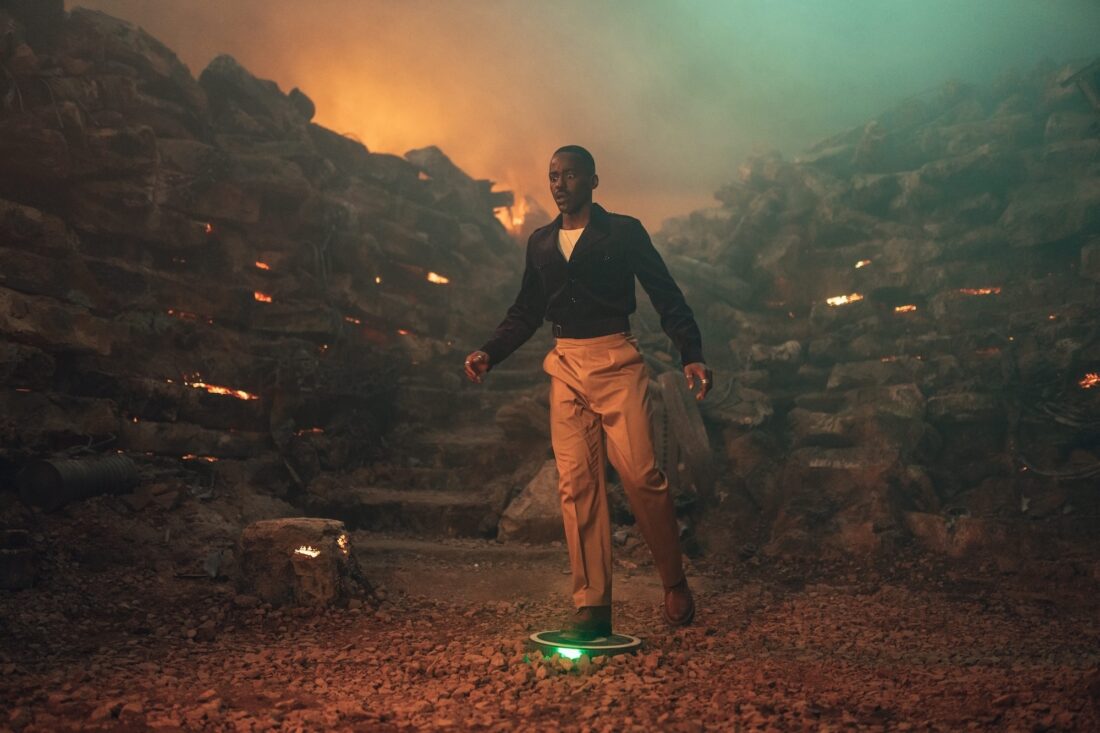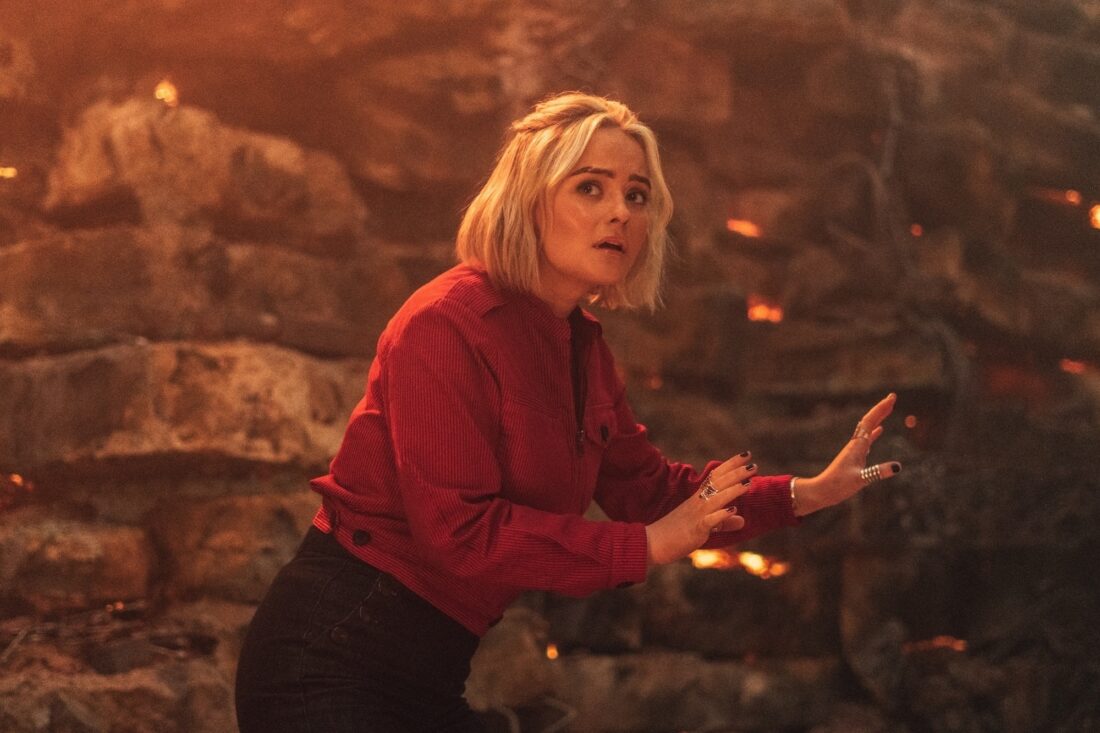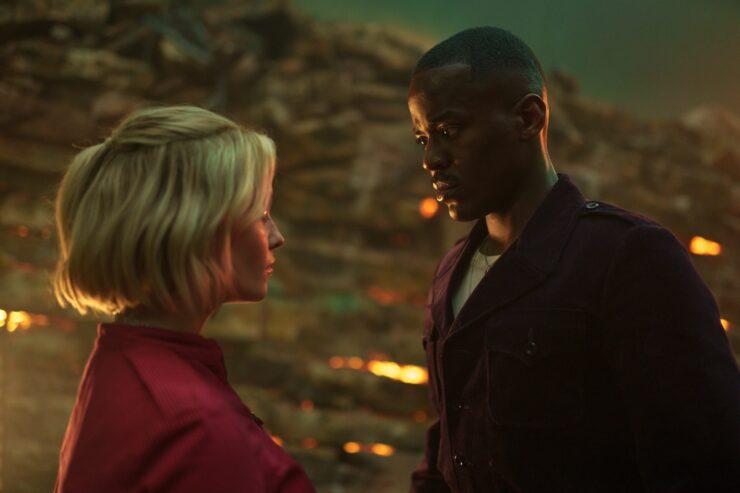We’re back with a landmine of an episode! (Get it? No, you’re right, it was bad. I feel bad.)
Recap
A man named John Francis Vater (Joe Anderson) is making his way home out of a war zone to see his daughter Splice (Caoilinn Springhall), but the ambulance (Susan Twist) in the area notices that he’s temporarily blinded and determines that his recovery rate is too slow—it terminates and compresses his body into a cylinder. The Doctor and Ruby land on this world, called Kastarion 3, and the Doctor wanders out first, accidentally stepping on a landmine. He cannot move, lest he set the thing off, and Ruby has to help him shift his weight by handing him Vater’s cylinder. They sing to one another to distract from how terrifying the ordeal is, and the Doctor manages to shift his weight a little with the cylinder in hand.
Back at the camp, Mundy Flynn (Varada Sethu) is helping to look after Splice, one of the medics in the army. She asks Canterbury James Olliphant (Bhav Joshi) to switch shifts with her—Olliphant clearly has a crush on her and Mundy hasn’t entirely figured that out. When Splice runs out to look for her father, she hears his voice, generated by an AI projection of her father connected to the cylinder that the Doctor is holding, and almost sets off the mine. Mundy arrives and the Doctor begins to put together what’s going on here. The equipment for the war is manufactured by Villengard, the biggest supplier of arms in the universe, and the company has parameters in place that ensure enough casualties to continue conflicts so they keep making money. He asks Mundy who they’re fighting and she tells him there are creatures in the mud or the fog, that they’ve been attacking since the Anglican soldiers landed. The Doctor informs her that there is no war, and her people are fighting shadows, which is exactly what the Villengard algorithm wants them to do.
The ambulance arrives and wants to treat the Doctor, meaning it will likely set off the mine, but the Doctor tells Mundy to scan him—if he dies in this explosion there will be enough energy to take half the planet with it. In order to stop the ambulance, Mundy tells Ruby to shoot her. While they’re busy arguing over logistics, Olliphant shoots Ruby, believing her to be a threat to Mundy. The ambulance scans Ruby, finding all sorts of information on her, but it cannot tell them who her parents are. It also won’t treat her because she isn’t insured. In the panic to try and stop the system Munday and Olliphant start talking about their feeling for each other, but Olliphant is killed by the ambulance—his AI has a message for Mundy that it’s okay that she didn’t love him, even though he loved her.
The Doctor tells the AI version of Vater to remember the part of him that’s a dad, and to go into the system to stop all of this. The ambulance claims to have deleted him, but Vater resurges, becoming a virus that destroys the algorithm, saving the planet. After a moment looking out at the planet, the Doctor tells Ruby it’s time to go because they’ve seen enough and human lifespans are too short to stand around.
Commentary

For some folks, I’m sure that this is the breath of seriousness they were hoping for in the wake of two very goofy opening episodes. But when I’m watching, what I see is a redux of Davies’ favorite mechanisms and tropes followed by a redux of Steven Moffat’s favorites. And I’m a little worried for it, knowing that we’re only getting one episode written by new writers (that’s episode six, a few weeks off yet).
That doesn’t mean there’s nothing good in this episode because Moffat’s strengths on encapsulated Who stories have created some of the best the show has ever seen: “Blink,” “Silence in the Library/Forests of the Dead,” “The Girl in the Fireplace”… There are things that make these entries sharp, snappy, and plain good television—tense plot mechanics, high key emotions, occasionally gorgeous use of repetition (I did punch the air at the reuse of “everywhere’s a beach eventually”).
One of those strengths is giving the lead actor(s) a chance to showcase their extreme talent, and Ncuti Gatwa took that opportunity with both hands and wrestled it into a marble flipping sculpture with this episode. It’s a great challenge for an actor, having to showcase all that visceral emotion while rooted to the spot, and he was ready for it. Absolutely gorgeous.
Having said that, this is literally the “The Empty Child/The Doctor Dances” condensed into a shorter format. It’s using the story to highlight different things, which I appreciate—war profiteering, blind religious obedience, capitalism run wild, the myriad problems around medical care, problems with AI—but the beats are the same. The ambulance is messing with people in a war zone; there’s an eerie child, this time looking for daddy instead of mommy (Splice isn’t a gas mask zombie, but she might as well be for how oddly her dialogue is written); the power of being a parent solves the problem and saves the day. They’re good beats, of course, and they still worked on me emotionally, but the recycling is a bit too obvious to miss.
There’s also Moffat’s endless well of romances where a man is sad that a woman doesn’t love him as well or much as he loves her. Which annoyed me enough with Amy and Rory—either leave or ask for what you’re worth, guy, you’ve had years to figure this out—but here it’s particularly egregious and bogged down in TV Problems that should not be an issue in this, the year of our Time Lord 2024.
It’s clear that we’re supposed to feel heartbroken over Olliphant’s message for Mundy because we know that she did care for him: that’s the TV drama plight here. But whether or not you care about that context, it doesn’t change the fact that this man recorded a post-death message to let a woman he loved know that it was okay that he died without her loving him in return—which is massively manipulative and utterly fucked as a choice for a person to make. Why would you leave this weird guilt-trippy aside for her, dude? Suck it up and tell this to her face in life; you don’t wait until after you’re dead to leave this little video note, the universe’s most passive-aggressive Nice Guy epitaph, and get kind thoughts for it.
And it’s extra upsetting because up until then, the romance had been kinda cute? So there’s that ruined by an afterlife WhatsApp message.
These points are a true shame, because when the episode is on, it is gorgeous. The growing bond between the Doctor and Ruby is good stuff, and it’s exciting to see the Doctor be more forthcoming with a companion, not only about history, but about his feelings. The transition from Thirteen to Fourteen to Fifteen can be felt keenly here, this sudden bend toward emotional honesty and a desire to be known now that the Doctor realizes they don’t fully know themselves. That’s where the heart is, and it hits just right every time they find it. More of this, please.
The mystery around Ruby also works better in this episode, I think, because it’s just the right amount of distraction without feeling overwrought and shaping too much of the episode itself. And the little bits and pieces of the Doctor’s past that keep barging in are so moving and also get the mystery balance just right: We’ve had the Doctor talk specifically about being a dad before, but the moment where he talks to Vater’s hologram about what that means, what being a father is, it’s the very first time we’ve seen how much it mattered to him. We have no details and I genuinely hope we never will on that, but we don’t need them—we can find what we need to know in Gatwa’s face.
Also, I love a sci-fi mechanism that requires a character to stay calm—that should get used way more often. Just a note from me, personally.
All of which is to say that there was so much to love about this episode and so much to deride that I’m feeling thoroughly whiplashed. Which generally describes my feelings about most of what Steven Moffat writes, so at least you can say he’s consistent.
Time and Space and Sundry

- The song that the Doctor is singing to calm himself down once he’s stepped on the mine is “The Skye Boat Song,” which was actually rewritten in the 19th century to be about Bonnie Prince Charlie, not originally about him. But the real deep cut of this is that the Second Doctor played this song on his recorder in the serial “The Web of Fear” back in 1968. I am loving the throughline we’re getting now of different Doctors preferring different instruments—Two had the recorder, Twelve had the guitar, Fifteen prefers to use his voice (and a gorgeous one it is, too).
- Vater is German for father, of course. That’s why Darth Vader is kind of a give away.
- Yes, Mundy is played by Varada Sethu, who is playing the new companion next season. And she said via a PR statement that this is the end of Mundy Flynn’s journey, so the question of how she gets onto the TARDIS is still up in the air. We don’t know if she was cast in this episode before or after the choice to bring her on as a companion, and it certainly wouldn’t be the first time someone guest-starred as a different character before starring on the show: Colin Baker was a guard on Gallifrey before he became the Sixth Doctor; Martha Jones made a comment about her cousin dying at the Battle of Canary Wharf to make sense of Freema Agyeman’s first appearance on the show; Peter Capaldi’s Twelfth Doctor had an entire lesson attached to bringing back the face of a man from Pompeii that he played in 2008; Karen Gillan was thankfully behind facepaint in that same Pompeii episode, so no one was the wiser when she got cast as Amy Pond.
- The ambulance being played by Susan Twist plays into an unfortunate tendency in Doctor Who to vilify middle-aged and elderly women as nameless figures of menace, and it would be nice if that could lay off for a bit? At least this one wasn’t in Moffat’s usual dressing, a fancy updo and blood red lipstick. (I only accept Missy in that pantheon, the rest can go home.)
- There are moments when the show is so aggressively British that you have to laugh, and Mundy Flynn saying “I’m Anglican,” like it’s this upsetting, powerful thing is definitely one of them. That’s not really going to read the same to anyone outside of the U.K., methinks.
See you next week!










